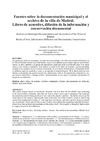Identificador persistente para citar o vincular este elemento:
https://accedacris.ulpgc.es/jspui/handle/10553/76006
| Campo DC | Valor | idioma |
|---|---|---|
| dc.contributor.author | Zozaya Montes, Leonor | en_US |
| dc.date.accessioned | 2020-11-25T18:36:45Z | - |
| dc.date.available | 2020-11-25T18:36:45Z | - |
| dc.date.issued | 2012 | en_US |
| dc.identifier.issn | 1988-2971 | en_US |
| dc.identifier.uri | https://accedacris.ulpgc.es/handle/10553/76006 | - |
| dc.description.abstract | Se analizan los libros de inventarios, los libros de conocimientos y los libros de acuerdos del Archivo de la Villa de Madrid a finales de la Edad Media. Aquí se han utilizado para estudiar aspectos archivísticos coevos, es decir, referidos a la propia documentación municipal (tanto la archivada como la no archivada), y a los archivos capitulares. Este análisis se centra en los libros de acuerdos, que han permitido estudiar el uso cotidiano de las escrituras municipales en su contexto administrativo, averiguando dónde se hallaban, quién las guardaba o cómo se recuperaba el material disperso. De la observación de estas fuentes se desprende que aportan mucha más información sobre la documentación municipal en uso, que sobre la archivada o el propio archivo. Tal desigualdad se saca aquí a la palestra, para plantear el porqué de esa diferencia. | en_US |
| dc.description.abstract | This article analyzes Books of Inventories, Registers and Acts from the late Middle Ages pertaining to the Town Archive of Madrid. Here they are used to study coeval aspects referring to the municipal documentation itself (it being archived or not) and to the chapter’s archives. The Books of Acts are the main object of this analysis, allowing the study of the daily use of the Council’s scripts in their living context and administrative reality, i.e.: who kept these documents, and when and how disperse materiel was recuperated. Observation of these sources renders more information regarding municipal documentation in use than archived documentation or the archive itself. This disparity is brought to light in order to suggest reasons for this difference. | en_US |
| dc.language | spa | en_US |
| dc.relation.ispartof | En la España Medieval | en_US |
| dc.source | En la España medieval, ISSN 0214-3038, Nº 35, 2012, págs. 349-365 | en_US |
| dc.subject | 5505 Ciencias auxiliares de la historia | en_US |
| dc.subject | 55 Historia | en_US |
| dc.subject.other | Libros de acuerdos | en_US |
| dc.subject.other | Archivos municipales | en_US |
| dc.subject.other | Fuentes | en_US |
| dc.subject.other | Documentación no archivada | en_US |
| dc.subject.other | Madrid | en_US |
| dc.subject.other | Baja Edad Media | en_US |
| dc.subject.other | Book of Acts | en_US |
| dc.subject.other | Township archives | en_US |
| dc.subject.other | Sources | en_US |
| dc.subject.other | Non-archived documentation | en_US |
| dc.subject.other | Low Middle Ages | en_US |
| dc.title | Fuentes sobre la documentación municipal y el archivo de la villa de Madrid. Libros de acuerdos, difusión de la información y conservación documental | en_US |
| dc.title.alternative | Sources on Municipal Documentation and the Archive of the Town of Madrid. Books of Acts, Information Diffusion and Documentary Conservation | en_US |
| dc.type | info:eu-repo/semantics/article | en_US |
| dc.type | Article | en_US |
| dc.identifier.doi | 10.5209/rev_ELEM.2012.v35.38913 | en_US |
| dc.description.lastpage | 365 | en_US |
| dc.identifier.issue | 0 | - |
| dc.description.firstpage | 349 | en_US |
| dc.relation.volume | 35 | en_US |
| dc.investigacion | Artes y Humanidades | en_US |
| dc.type2 | Artículo | en_US |
| dc.description.numberofpages | 17 | en_US |
| dc.utils.revision | Sí | en_US |
| dc.date.coverdate | Mayo 2012 | en_US |
| dc.identifier.ulpgc | No | en_US |
| dc.contributor.buulpgc | BU-HUM | en_US |
| item.fulltext | Con texto completo | - |
| item.grantfulltext | open | - |
| crisitem.author.dept | GIR IATEXT: Patrimonio cultural: textos, materialidades y memorias | - |
| crisitem.author.dept | IU de Análisis y Aplicaciones Textuales | - |
| crisitem.author.dept | Departamento de Ciencias Históricas | - |
| crisitem.author.orcid | 0000-0002-6256-1888 | - |
| crisitem.author.parentorg | IU de Análisis y Aplicaciones Textuales | - |
| crisitem.author.fullName | Zozaya Montes, Leonor | - |
| Colección: | Artículos | |
Visitas
146
actualizado el 09-ene-2026
Descargas
102
actualizado el 09-ene-2026
Google ScholarTM
Verifica
Altmetric
Comparte
Exporta metadatos
Los elementos en ULPGC accedaCRIS están protegidos por derechos de autor con todos los derechos reservados, a menos que se indique lo contrario.
